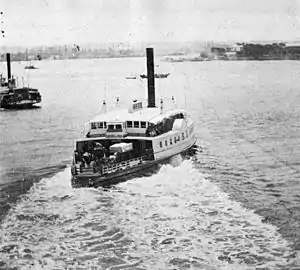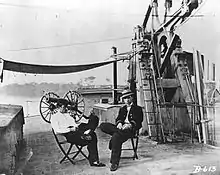 Hunchback in commercial service as a New York ferry, 1859, prior to her acquisition by the U.S. Navy | |
| History | |
|---|---|
| Name | USS Hunchback |
| Laid down | 1852 |
| Acquired | by purchase, 16 December 1861 |
| Commissioned | 3 January 1862 |
| Decommissioned | 12 June 1865 |
| Fate | Sold, 12 July 1865 |
| General characteristics | |
| Type | Gunboat |
| Displacement | 512 long tons (520 t) |
| Length | 179 ft (55 m) |
| Beam | 29 ft (8.8 m) |
| Depth of hold | 10 ft (3.0 m) |
| Propulsion | 1 × 40 inch bore, 8-foot stroke vertical beam steam engine; sidewheels |
| Speed | 12 knots (22 km/h; 14 mph) |
| Complement | 125 officers and enlisted |
| Armament |
|
USS Hunchback was a side-wheel, steam-powered gunboat used by the United States Navy during the American Civil War.
Pre-Civil War
The original wooden boat that was later renamed as the USS Hunchback was built in New York City in 1852 for civilian use as a ferry. On 16 December 1861, with the onset of the Civil War, the United States Navy purchased the boat.[1] Within a month of its purchase, the Navy had converted the ferry into a gunboat and commissioned it for use in the war. The refitted ship was ready for departure in early January 1862 with Acting Lt. Edmund Colhoun in command.[2]
Civil War presence

USS Hunchback primarily served in southeastern Virginia, in the area of the James River, and northeastern North Carolina, in the area sounds.

Army support
The Hunchback's first assignment was to the North Atlantic Blockading Squadron, which had plans to launch an attack to capture Roanoke Island. After steaming to the Hatteras Inlet in late January where the squadron was staging its amphibious operation, the Hunchback and other ships departed for Fort Barrow. While in subsequent battle, the Hunchback carried her assault at close range towards Fort Barrow and received heavy damage. Despite the ship's battle scars, she played an important role in securing the fort for ground forces and was a key contributor to the successful attack on the Confederate forces.[1] After the successful battle at Fort Barrow, the Hunchback continued to support Army operations by carrying troops up the Chowan River to New Bern, North Carolina, where the Confederate army had a large supply depot. With Hunchback providing the heavy artillery for the assault, the Union forces captured New Bern and the Confederate depot.[1]
On patrol
After her major accomplishments at Fort Barrow and New Bern, the Hunchback was assigned to patrol the North Carolina Sounds. While on patrol, the ship made several trips up the Chowan River. During these patrols, the Hunchback was responsible for the capture of four small ships and the destruction of one Confederate battery.[1] In early October 1862, the Hunchback received an urgent request for assistance near the city of Franklin, Virginia, where Confederate forces were gathering. Responding to the call, the Hunchback set towards Franklin in what became known as The Joint Expedition Against Franklin. The ship was unable to reach Franklin due to the narrow river and strong Confederate resistance. The Hunchback was eventually forced to retreat after coming within three-quarters of a mile of the city.[3] During the rest of the Hunchback's time on patrol, she was involved in a reconnaissance mission to Hamilton, North Carolina, and the defense of Fort Anderson which came under Confederate attack.
The James River
After aiding in the siege against New Bern, the combined damage from battle and routine wear left the Hunchback crippled. The ship steamed to Baltimore, Maryland, for repairs. After necessary repairs, she was assigned to patrol on the James River. For the ship's remaining days as a gun boat, it patrolled the James with occasional attacks on Confederate positions, while aiding other ships in need of assistance.[1]
Post-Civil War
With the end of the Civil War imminent, on 17 March 1865, the Hunchback returned to its original patrol on the sounds of North Carolina. After one final mission in April up the Chowan River, the Navy sent the ship back to New York Harbor, where it was decommissioned on 12 June 1865. A month later, the ship was sold to the Brooklyn and New York Ferry Company for civilian use. The boat was renamed the General Grant and remained in civilian use until approximately 1880, when she was retired and scrapped.[1][2]
References
- ↑ United States. US Navy. Report of the Secretary of the Navy, December, 1862. pg 150.
This article incorporates text from the public domain Dictionary of American Naval Fighting Ships. The entry can be found here.